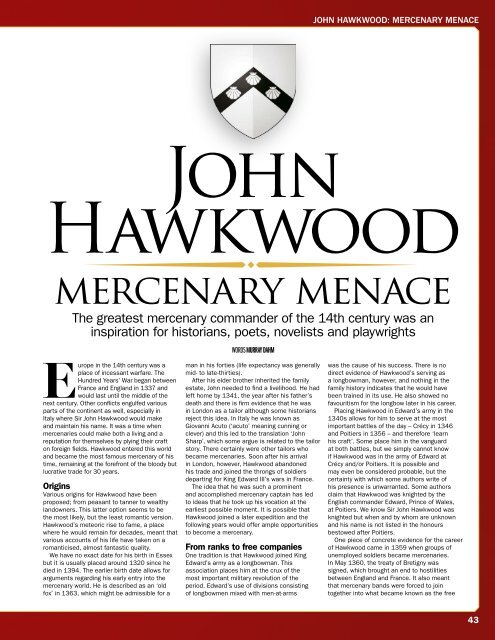You also want an ePaper? Increase the reach of your titles
YUMPU automatically turns print PDFs into web optimized ePapers that Google loves.
JOHN HAWKWOOD: MERCENARY MENACE<br />
John<br />
Hawkwood<br />
mercenary menace<br />
The greatest mercenary commander <strong>of</strong> the 14th century was an<br />
inspiration for historians, poets, novelists and playwrights<br />
WORDS MURRAY DAHM<br />
Europe in the 14th century was a<br />
place <strong>of</strong> incessant warfare. The<br />
Hundred Years’ <strong>War</strong> began between<br />
France and England in 1337 and<br />
would last until the middle <strong>of</strong> the<br />
next century. Other conflicts engulfed various<br />
parts <strong>of</strong> the continent as well, especially in<br />
Italy where Sir John Hawkwood would make<br />
and maintain his name. It was a time when<br />
mercenaries could make both a living and a<br />
reputation for themselves by plying their craft<br />
on foreign fields. Hawkwood entered this world<br />
and became the most famous mercenary <strong>of</strong> his<br />
time, remaining at the forefront <strong>of</strong> the bloody but<br />
lucrative trade for 30 years.<br />
Origins<br />
Various origins for Hawkwood have been<br />
proposed; from peasant to tanner to wealthy<br />
landowners. This latter option seems to be<br />
the most likely, but the least romantic version.<br />
Hawkwood’s meteoric rise to fame, a place<br />
where he would remain for decades, meant that<br />
various accounts <strong>of</strong> his life have taken on a<br />
romanticised, almost fantastic quality.<br />
We have no exact date for his birth in Essex<br />
but it is usually placed around 1320 since he<br />
died in 1394. The earlier birth date allows for<br />
arguments regarding his early entry into the<br />
mercenary world. He is described as an ‘old<br />
fox’ in 1363, which might be admissible for a<br />
man in his forties (life expectancy was generally<br />
mid- to late-thirties).<br />
After his elder brother inherited the family<br />
estate, John needed to find a livelihood. He had<br />
left home by 1341, the year after his father’s<br />
death and there is firm evidence that he was<br />
in London as a tailor although some historians<br />
reject this idea. In Italy he was known as<br />
Giovanni Acuto (‘acuto’ meaning cunning or<br />
clever) and this led to the translation ‘John<br />
Sharp’, which some argue is related to the tailor<br />
story. There certainly were other tailors who<br />
became mercenaries. Soon after his arrival<br />
in London, however, Hawkwood abandoned<br />
his trade and joined the throngs <strong>of</strong> soldiers<br />
departing for King Edward III’s wars in France.<br />
The idea that he was such a prominent<br />
and accomplished mercenary captain has led<br />
to ideas that he took up his vocation at the<br />
earliest possible moment. It is possible that<br />
Hawkwood joined a later expedition and the<br />
following years would <strong>of</strong>fer ample opportunities<br />
to become a mercenary.<br />
From ranks to free companies<br />
One tradition is that Hawkwood joined King<br />
Edward’s army as a longbowman. This<br />
association places him at the crux <strong>of</strong> the<br />
most important military revolution <strong>of</strong> the<br />
period. Edward’s use <strong>of</strong> divisions consisting<br />
<strong>of</strong> longbowmen mixed with men-at-arms<br />
was the cause <strong>of</strong> his success. There is no<br />
direct evidence <strong>of</strong> Hawkwood’s serving as<br />
a longbowman, however, and nothing in the<br />
family history indicates that he would have<br />
been trained in its use. He also showed no<br />
favouritism for the longbow later in his career.<br />
Placing Hawkwood in Edward’s army in the<br />
1340s allows for him to serve at the most<br />
important battles <strong>of</strong> the day – Crécy in 1346<br />
and Poitiers in 1356 – and therefore ‘learn<br />
his craft’. Some place him in the vanguard<br />
at both battles, but we simply cannot know<br />
if Hawkwood was in the army <strong>of</strong> Edward at<br />
Crécy and/or Poitiers. It is possible and<br />
may even be considered probable, but the<br />
certainty with which some authors write <strong>of</strong><br />
his presence is unwarranted. Some authors<br />
claim that Hawkwood was knighted by the<br />
English commander Edward, Prince <strong>of</strong> Wales,<br />
at Poitiers. We know Sir John Hawkwood was<br />
knighted but when and by whom are unknown<br />
and his name is not listed in the honours<br />
bestowed after Poitiers.<br />
One piece <strong>of</strong> concrete evidence for the career<br />
<strong>of</strong> Hawkwood came in 1359 when groups <strong>of</strong><br />
unemployed soldiers became mercenaries.<br />
In May 1360, the treaty <strong>of</strong> Bretigny was<br />
signed, which brought an end to hostilities<br />
between England and France. It also meant<br />
that mercenary bands were forced to join<br />
together into what became known as the free<br />
<strong>43</strong>


















